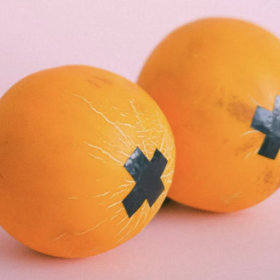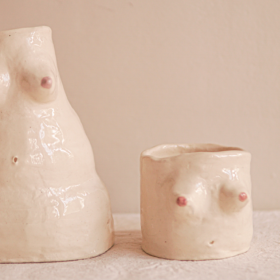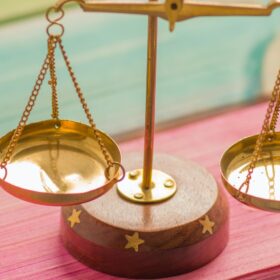
Why are my breasts sore?
In this article
What's the lowdown?
There are two types of breast pain: cyclical and non-cyclical
Cyclical breast pain can include burning, stabbing, prickling, heaviness and tenderness
Cyclical breast pain is very common and will affect around two in three women
Non-cyclical breast pain can be caused by injury, infection and pregnancy
Chest wall pain can be confused for breast pain due to the anatomy of the body
Starflower oil is a great non-hormonal treatment option for sore breasts
You can buy starflower oil directly from The Lowdown.
What are the different types of breast pain?
Cyclical breast pain
Sore boobs can be a real pain in the, well, boobs! Sore breasts are linked to the change in hormone levels prior to your period arriving and for some women are the tell-tale sign that your period is due. The hormonal changes can cause an increased sensitivity in the breast tissue, resulting in pain and tenderness. Once your period arrives, the pain can stop. Until your next period, that is!
Breast pain that is linked to your cycle is called cyclical pain. This is the most common cause of breast pain and will affect around two in three women.
Symptoms of cyclical breast pain can include:
- burning
- stabbing
- prickling
- heaviness
- tenderness
Sore breasts during your period can range from mild to severe, affecting one or both breasts. Pain may also spread down the arm, to the shoulder blade, and along to the armpit. But treatment options are available to buy without the need for a trip to the doctor.
Those who have experienced the menopause should find that cyclical breast pain stops. But more on that later!
Non-cyclical breast pain
The second type of breast pain is called non-cyclical and is not related to your menstrual cycle. It can therefore appear at any time of the month. The cause is sometimes unclear, but it may be caused by:
- a breast abscess
- mastitis (an infection usually associated with breastfeeding)
- an injury to the breast
- some antidepressant drugs
Non-cyclical breast pain can be similar to cyclical, in that it can cause stabbing, burning or a prickling pain and may affect one or both breasts. Non-cyclical pain can come and go or remain constant. In around 50% of those experiencing this type of issue, the pain reduces – or disappears completely – on its own.
Chest pain – sort of
Now, whilst there are only technically two types of breast pain, it’s worth noting a third. Chest wall pain isn’t actually breast pain, as the source is somewhere else. But it can feel like the pain is in the breast. Causes of this type of pain include angina, a pulled muscle, and inflammation. The pain may be felt in a single area, on only one side, or in a large area of the breast, and can feel sharp or burning. Pain may feel worse when moving or when pressure is applied to the chest wall area.
What can cause breast pain?
Breasts are very sensitive to changes in hormones, which can happen at different points throughout life due to a number of factors.
All different types of contraceptives can cause tender or enlarged breasts. Come to The Lowdown’s homepage and follow: Contraception > Common Side Effects > Tender Breasts/Enlarged Breasts to find out more.
Sore breasts, the pill and pregnancy
The contraceptive pill can cause breast tenderness as a side effect, and you might find this an unwanted side effect of your chosen contraceptive method. If you find your pill is causing you pain and you want to try an alternative, our contraceptive comparison tool is a great way to see commonly reported side effects from The Lowdown users.
An early sign of pregnancy can include tender breasts. What’s most unhelpful is that many early warning signs of pregnancy can look remarkably similar to PMS. If you think you might be pregnant, there’s really only one sure-fire way to find out – do a test!
Breastfeeding and boobs
Sore boobs from breastfeeding can put you on the extreme end of the breast pain scale. Breast engorgement can leave your boobs feeling hard and painful. This can happen early on in breastfeeding when it can take a while for mum and baby to get into the flow of supply and demand.
Sore and cracked nipples are as painful as they sound, so speak to your midwife or healthcare provider who can give you tips on the positioning of your baby during feeding.
Mastitis is another cause of breast pain for those who are breastfeeding, caused by a blocked milk duct. As well as a sore, hot boobs, mastitis can cause flu-like symptoms. Carry on breastfeeding, but call your doctor if symptoms do not improve within 12-24 hours, as you may need antibiotics.
Perimenopause and the menopause
Between the ages of 45 and 55 your periods will usually stop, due to a change in hormone levels. This is due to, you guessed it, the menopause. The time before your periods stop, but when you’re experiencing menopausal symptoms, is called perimenopause.
During this time, you may experience a number of symptoms including the most commonly known: hot flushes.
Another symptom you may experience during menopause is breast pain. The good news is once you’ve gone through the menopause – meaning your last period was over twelve months ago – the breast pain should stop. The bad news, however, is if you’re taking HRT for the treatment of symptoms of the menopause, one of the main side effects is breast tenderness. (A side effect of both oestrogen and progestogen.)
Check out our blog on contraception and the menopause for further information on the use of the pill, patch or vaginal ring to help alleviate menopausal symptoms.
How do I relieve sore breasts?
Starflower oil, which comes from the borage seed, is one of the richest sources of gamma-linolenic acid (GLA). It can be used to help joint aches, skin problems and hormonal imbalances, to name just a few. GLA has also been found to help in the management of breast pain. Studies are unclear as to why this may be the case, but with few side effects, it is a great choice for the treatment of sore breasts.
There are some interactions to be aware of. It is advised not to take starflower oil if you suffer from epilepsy, and talk to your doctor if you take blood thinning tablets as GLA can slow blood clotting, meaning a chance of increased bleeding.
If you are pregnant or trying to conceive, give products containing GLA a miss as it can increase the chance of miscarriage. There is an interaction with a few other drugs, so have a quick chat with a doctor or pharmacist before taking starflower oil if you’re on any other meds. Or, speak to one of The Lowdown’s expert women’s health GPs for more advice – especially if you’re suffering from side effects of your contraception.
Alternative options include ibuprofen and paracetamol, or hormone-suppressing drugs such as danazol and tamoxifen. The latter two come with side effects and can make hormonal contraception less reliable. They also require a prescription, so talk to a GP if you want to consider this option.
When to speak to a doctor about sore breasts
Breast pain is very common, and as a symptom on its own, is very unlikely to be a sign of cancer. If you experience breast pain, it does not increase your chances of getting breast cancer. However if you notice a lump, or any changes to the skin on your breast or nipple, book an appointment with your healthcare team urgently.
Pain or no pain, it’s always a good idea to get into the habit of checking your breasts monthly, and getting to know your body is a great way to quickly identify anything out of the ordinary. Coppafeel! has a brilliant video on how to check your boobs.
It’s also worth seeing the doctor if the pain you’re experiencing doesn’t improve, or if the painkillers you’re taking for the pain just aren’t hitting the spot. Seek medical advice if you have a high temperature, discharge, dimpling, rash, sunken nipple, or your breast is red, hot or swollen.
And if you think you might be pregnant, take a pregnancy test!
Our medical review process
This article has been medically reviewed for factual and up to date information by a Lowdown doctor.



